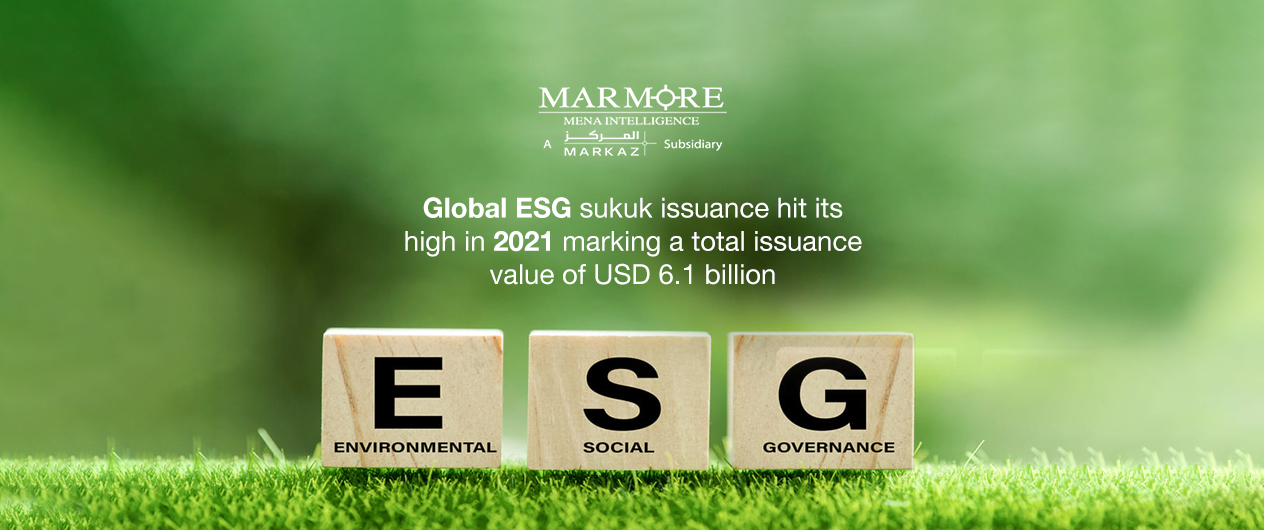Environmental, Sociala and Governance (ESG) investment is emerging as a priority among global investors, with ESG-related assets under management expected to increase from USD 18.4 trillion in 2021 to USD 33.9 trillion by 2026, growing at a CAGR of 12.7%.[1] ESG sukuk have been gaining wide attention particularly in the GCC region as it enables issuers to combine Shariah principles and ESG, appealing to a large investor base including Shariah compliant, conventional and ESG investors. ESG sukuk incorporates an additional layer of governance (Shariah) and ensure flow of funds to projects consistent with the Islamic and ESG considerations. The integration of Islamic and ESG principles have increased the funds available to borrowers as religious investors focusing on Islamic principles would prefer investing in funds that comply with ESG mandates.
In 2018, Indonesia became the first country to issue sovereign green sukuk. By H1 2022, Indonesia issued USD 5.8 billion worth green sukuk to fund its renewable energy projects. ESG sukuk issuance hit its high in 2021 marking a total issuance value of USD 6.1 billion, which was higher than 2019 and 2020, where the issuance value was USD 3.9 billion and USD 4.8 billion respectively. Among global ESG sukuk, green and sustainability sukuk has gained significant traction with USD 4.4 billion worth issuances in H1 2022. Within the broad ESG spectrum, green and sustainability sukuk allocates funds to specific social and green projects that deliver positive environmental impact. ESG sukuk also encompasses social, transition and blue sukuk. While blue sukuk allocates funds to marine related projects, transition sukuk fund projects aimed at sustainable transition of the economy. Notably, GCC and Indonesia constitute 53% of global green and sustainability sukuk issuance.
GCC Green and sustainability sukuk issuance 2018 - H1 2022
Source: Global ethical finance
ESG Sukuk market in GCC
ESG sukuk gained momentum in GCC during 2019 with UAE-based Majid Al Futtaim being the first issuer of green and sustainability sukuk, raising USD 1.2 billion. The issue accounted for 30% of the total ESG sukuk issuances in GCC during the year. Till H1 2022, green and sustainability sukuk make up 80% of the green and sustainability bonds issued by GCC based issuers.[2]
Issuers of green and sustainability sukuk in GCC from 2019-2022
Source: Global ethical finance
Saudi Arabia leads the GCC countries in terms of ESG sukuk issuance, with cumulative issuance totaling to USD 2.8 billion from 2018 till H1 2022. Saudi National Bank and Riyadh Bank issued sustainability linked bonds worth USD 750 mn. each during H1 2022. H1 2022 witnessed the first ESG sukuk issuance in Bahrain from Infracorp, the infrastructure investment arm of Gulf Finance House (GFH).
Key demand drivers:
- Government initiatives to promote sustainability and combat climate change: Primarily, the demand for ESG sukuk in GCC magnified on the back of the government’s efforts to prioritize social and environmental issues. In line with the global economies, UAE and Saudi Arabia have made commitments to achieve its Net Zero target by 2050 and 2060 respectively. To achieve the goal, UAE has allocated USD 165 billion for clean energy. Saudi Arabia aims to improve the share of natural gas to around 50% by 2030. Moreover, green and sustainability sukuk is expected to be the top theme of discussion in the upcoming UN Climate Change Conference: COP28 scheduled to be held in Dubai from 30th November – 12th December 2023. GCC region’s strides towards a greener economy has been a catalyst in the growth of sustainability projects and issuance of ESG sukuk.
- Capital requirements: Companies ramped up sukuk issuances to fund their expansion and diversification projects. The widening infrastructure investment gap during the COVID-19 pandemic fueled the corporates need to raise private funds from capital markets through bonds and sukuks. With the growing need for funding infrastructure and the rising demand for ESG & Sharia compliant instruments, companies could use ESG Sukuk as an attractive tool for funding sustainable projects.
- Favourable regulatory policies: The regulatory policies and framework in the GCC countries have also been conducive to the rapid development of the ESG sukuk market. For instance, Qatar Financial Center (QFC) has been a forerunner in launching GCC’s first regulatory framework dedicated towards the governance of sustainable sukuk and bonds. The policies ensure transparency and adherence to ESG principles and minimize chances of greenwashing. The UAE Ministry of Climate Change and Environment has drafted the UAE Sustainable Finance Framework 2021-31 laying down initiatives to improve the demand and supply for sustainable and ESG-integrated financial products. Kuwait’s Capital Markets Authority (CMA) has formulated guidelines to regulate the issue and subscription of green and sustainability linked sukuk and bonds.
Major ESG Sukuk issuances in the GCC:
What
to expect in the future?
Owing to the sustainability transition projects undertaken by the GCC countries, the number of ESG sukuk issuances is expected to continue its upward momentum in 2023. Governments in GCC countries have increasingly started investing in renewable energy sector integrating ESG criteria. The demand of ESG linked financial products from foreign investors is anticipated to serve as catalyst for increased ESG sukuk issuances in the region. GCC countries such as Qatar and Saudi Arabia have expressed their intention to issue ESG sukuk in the coming years when market conditions remain suitable.
Stay Tuned To Marmore MENA Insights!
Never miss a patch or an update with Marmore's Newsletter. Subscribe now!
Related Article
Kuwait’s Approval of Public Debt Law: Re-emerging on Investors’ Radar
Kuwait has passed the long-awaited debt law in March 2025. The blog explores the importance of the law, the expected benefits and outlook for the countrys return to debt markets.
Read MoreThe Dynamic Rise of Fintech in the GCC
The convergence of technology and finance is reshaping the GCC Financial Ecosystem. The blog explores key players, regulatory framework and market dynamics of Fintech in the GCC region.
Read MoreHow secure are GCC banks compared to their global counterparts?
The blog examines the impact of cyber attacks on financial institutions and the resiliency of GCC banks compared to their global counterparts
Read MoreTags
No Tags!





